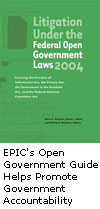|
Introduction
 The
Freedom of Information Act establishes a
legal right for individuals to obtain records in the
possession
of government agencies. The FOIA is critical
for the functioning of democratic government because
it helps
ensure that the public is fully informed
about matters of public concern. The FOIA has helped
uncover fraud,
waste, and abuse in the federal government.
It has become particularly important in the last few
years
as the government has tried to keep more
of its activities secret. The
Freedom of Information Act establishes a
legal right for individuals to obtain records in the
possession
of government agencies. The FOIA is critical
for the functioning of democratic government because
it helps
ensure that the public is fully informed
about matters of public concern. The FOIA has helped
uncover fraud,
waste, and abuse in the federal government.
It has become particularly important in the last few
years
as the government has tried to keep more
of its activities secret.
A hallmark
of the new surveillance measures proposed
by various government agencies is their disregard
for public accountability. As the
government seeks to expand
its power to collect information about individuals,
it increasingly hides that surveillance
power behind a wall
of secrecy. Congress has long recognized
this tendency in the Executive Branch, and
sought to limit government
secrecy by creating legal obligations of
openness under the FOIA and the Privacy Act
of 1974. EPIC has
used these
open government laws aggressively to enable
public oversight of potentially invasive
surveillance initiatives.
Public access
through the FOIA not only allows for a more
informed public
debate over new surveillance proposals,
but also ensures accountability for
government officials. Public debate fosters
the development of more robust
security systems and leads to solutions
that better respect the nation's democratic
values. EPIC's FOIA litigation
activity over the past year has resulted
in disclosure of information
about several government surveillance
programs. The EPIC FOIA Gallery highlights
some of the most significant
documents we obtained in the past year. |
| |
| FBI
Reports Detailed Apparent Intelligence Abuses

Through Freedom of Information Act litigation, EPIC obtained nearly two dozen reports of apparent FBI misconduct in intelligence investigations, including improper e-mail collection, eavesdropping on the wrong person's telephone calls, investigations conducted for months without proper reporting or oversight, an FBI agent's seizure of financial records in violation of federal privacy law, and an unidentified intelligence agency's unlawful physical search. The reports sparked an inquiry by
the Justice Department Inspector General into
whether any of the instances involved abuse of
Patriot Act powers.
|
|
| |
| Documents
Showed Internal Reactions to Warrantless Surveillance
Program

EPIC
obtained some of the first Freedom of Information
Act documents released by the government about
the National Security Agency's controversial
warrantless surveillance program. The documents
included emails
and a memo (pdf) from a former
high-level Justice Department official expressing
doubt about the government's argument in favor
of the legality of the program. EPIC also obtained
internal
messages (pdf) from the NSA's director
to agency staff, defending the NSA's warrantless
eavesdropping and discouraging employees from
discussing the issue with the news media. |
|
| |
| Errors
Continued to Plague Government Watch Lists

Documents
(pdf) obtained by EPIC from the Transportation
Security Administration under the Freedom of
Information Act revealed nearly a hundred complaints
from airline passengers between November 2003
and May 2004. The most common complaint is that
passengers have been
wrongly placed on a government watch list. Numerous complaints
show passengers' frustration with the agency's
failure to resolve their misidentification problems.
EPIC also obtained complaints (pdf, part
1, part
2)
from the Department of Homeland Security showing
that visitors to the United States have experienced
problems being "processed" by
the United States Visitor and Immigrant Status
Indicator Technology (US-VISIT) program. Complaints
about the program include emails between an airline
and the Department about 32 crew members who
experienced fingerprint scanning mismatches that
caused them to be improperly flagged by government
watch lists. |
|
| |
| Documents Shed Light on Voting Standards Development Process

In
the past year, EPIC obtained numerous documents
under the Freedom of Information Act revealing
the Election Assistance Commission's development
of standards for voting technology. The documents
included complete draft standards for voting
technology developed by the agency, as well as
no-bid contracts (pdf, part
1, part
2) for work
on voting system standards awarded to vendors
with ties to the Commission's technical advisory
committee. |
|
| |
| Data
Broker Proposed Massive Web Monitoring Plan

Through
the Freedom of Information Act, EPIC obtained
documents (pdf)
showing that commercial data broker Acxiom proposed
a system to automatically scan the Internet and
identify websites "belonging
to advocates of extremist views and actions[.]" The
plan proposed to extract personal information
from websites and use the data for "cross-reference
analysis to establish possible connections between
extremist groups" and
to collect data for an "Identity Verification
System to be used by airlines, rental car agencies,
and other business and government agencies." |
|
| |
| Social Security Administration Adopted Broad Information Disclosure Policy After 9/11

Documents
(pdf) obtained by EPIC though the Freedom of
Information Act revealed that after 9/11, the
Social Security Administration adopted a broad "ad
hoc" policy
to allow the disclosure of sensitive personal
information to law enforcement officials certifying
that the data were sought "in connection" with
a 9/11 investigation. As a result of the disclosure,
Congresswoman Carolyn Maloney called
for hearings
(pdf) and asked
the agency (pdf)
to explain its new policy.
|
|
| |